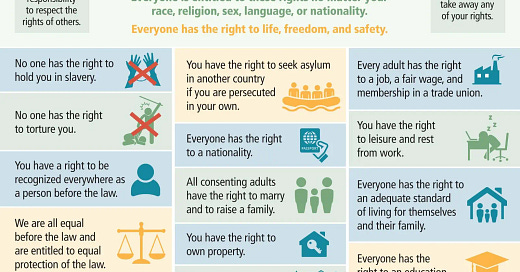Re-imagining the world we want to live in
A synthesis of thoughts from our recent general meeting.
About 50 of us came together for the general meeting and broke out into affinity groups to work through re-imagining the world we want to live in. Re-imagining is an act of resistance and renewal to overcome the internalized belief that “this is just how things are.” It reminds us that systems are made by people—and people can change them. You can find the original group responses and meeting agenda here.
Synthesis
What standards do we want to set for how we treat each other, how we share resources, and how we relate to the Earth?
We want to set standards rooted in dignity, interdependence, and sustainability. The Golden Rule, “Do unto others as you would have them do unto you,” guides our speech and actions. We treat each other with respect, kindness, and curiosity, practicing emotional regulation, active listening, and clear communication. We reject derogatory labels and commit to speaking only what is true, necessary, and useful. We celebrate both diversity and science, while embracing new experiences and information.
We believe in people over profit—building systems where wealth and opportunity are shared, not hoarded. Every person deserves a baseline standard of living. Our relationship with one another and the Earth must be one of respect and responsibility. We acknowledge that climate change is real, and we respond with local climate justice efforts—clean air and water, renewable energy, reduced plastic use, and regenerative practices.
This is a call to co-create a world grounded in equality, liberty, solidarity, and the belief that everyone thrives when we take care of each other and the planet.
What does success look like in this new world — for individuals, for communities, for governments?
For individuals: Success means having your basic needs met—access to food, housing, education, healthcare, and community connection. It means living with dignity, autonomy, and purpose. It’s about lifelong learning, emotional intelligence, and the freedom to explore your identity and gifts without fear. A successful life is one where you can thrive, contribute, rest, and grow.
For communities: Healthy communities share resources equitably, celebrate diversity, and foster interdependence, not isolation. People of different backgrounds and generations learn from and work with one another. There are systems for conflict resolution, mutual aid, and inclusive decision-making. We embrace non-nuclear families, interfaith coalitions, and community-based solutions like urban farming, public transit, and local energy cooperatives.
For government: A successful government is transparent, efficient, accountable, and built on participation and justice. It enforces public policies that prioritize people over corporations, and it funds the systems—education, health, transit, climate resilience—that make a good life possible. Public dollars for public schools!
How do we include those who seemingly want to oppose us at every step?
Including those who seem to oppose us begins with a shift in posture—from combat to curiosity. It doesn’t mean tolerating harm or compromising our values, but it does mean recognizing shared humanity and engaging with authenticity and intention.
We start by actively listening—not to concede, but to understand what's beneath the resistance. Fear? Misinformation? A different lived experience? Before reacting, we pause, reflect, and choose to respond with clarity, not heat. We learn their language and values, not to mimic, but to translate our shared goals. Maybe we both care about children, safety, or fairness—even if we define them differently. That common ground is where we begin.
We invite people into community and collaboration, offering tangible, hopeful alternatives rather than shaming or isolating them, while also holding boundaries firmly—no bigotry, no harm. We lend a hand when it’s safe to do so, and we walk away when it’s not. We model the world we're trying to build.
If you weren’t able to join us last night, how do YOU envision the world we’re striving towards?
… Perhaps our group might consider adopting the UDHR: Universal Declaration of Human Rights, pioneered by Eleanor Roosevelt after WWII.






